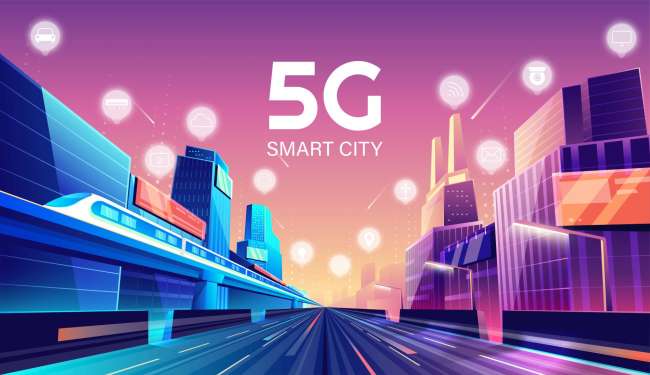The dawn of 5G in Africa is here with us and what was once seen as a dream has turned to reality, albeit with revised expectations. South Africa became the first country in Africa to offer commercial 5G services with Rain, Vodacom and MTN piloting it in various cities and using different methods to reach their clients.
Rain launched the country’s first commercial 5G network in partnership with China’s Huawei Technologies in 2019 in Johannesburg and Tshwane, offering subscribers unlimited data at speeds of up to 700Mbps for R1,000 per month. Since launch Rain has doubled its 5G coverage, achieving it by adding more sites and providing a new 5G router to users.
Vodacom’s launch to the mobile market covered three cities: Johannesburg, Pretoria and Cape Town. It was able to fast track the launch by using a temporary spectrum assigned by the South African telecommunications regulator ICASA.
MTN said it launched 5G services across 100 network towers in Johannesburg, Cape Town, Bloemfontein, Port Elizabeth and several smaller towns.
Apart from South Africa, there have been increased trials of the fifth-generation technology in countries across Africa mainly in Kenya, Nigeria, DR Congo, Senegal, Algeria and Egypt. Kenya through its main telecommunication company has already done tests on this technology using Huawei infrastructure.
5G networks come with the promise of even more speed and capacity than currently exists. To put it into context, downloading a video of 4GB will take about half a minute and 5G networks are also projected to be able to service a million devices within a square kilometer—100 times more than 4G networks can handle in the same area.
Before transitioning to the new 5G
Many industry observers believe that the still fresh deployment of 4G, the capital-intensive 5G infrastructure and enabling devices, and the overall financial health of the telecommunication sector in these countries mean mobile service providers (MSPs) in emerging markets will be in no rush to upgrade their subscribers to 5G.
The rationale here is for them to first exhaust the potential of 4G and previous generation networks before migrating to 5G. They need to wait for 5G infrastructure and devices to be affordable enough once economies of scale compile in the developed world. Under these assumptions, wide deployment of 5G services in emerging markets may not materialize before at least five years from now.
The GSMA Mobile Economy report estimates that only 3% of all connections in Africa will be 5G by 2025 or slightly above 28 million devices. Instead, there will be growth in both 3G and 4G with the latter becoming the dominant path.
GSMA Africa Head, Akinwale Goodluck was quoted by Connecting Africa, a tech magazine, noting that though there is great potential in Africa for 5G, the continent will prioritize filling the gaps provided by other bandwidths.
“One thing that is clear is that our 4G pipes are still relatively empty; the average across the region is still below 10%, in terms of throughput, so there is a lot of work still to be done in terms of filling up the 4G pipes and rolling out the 4G networks. [After that] 5G will come.”
Read also:Defiant Huawei pushes on with 5G release(Opens in a new browser tab)
Emerging markets have always lagged behind in adopting the latest generation mobile networks. For example, it took six to seven years for some emerging markets – including India, Egypt, Kenya, Tanzania, Philippines, Turkey, and major Latin American countries – to deploy 3G services after these services had been widely commercially available in the developed world according to Malik Saadi, Vice President, Strategic Technologies at ABI Research.
“Although some of these countries – including India, Brazil, and Turkey – have adopted 4G much faster (three years after the first world commercial deployment), the bulk of emerging markets launched the technology only in 2016 or after. So, will 5G submit to a similar fate and will not be widely deployed in emerging markets until 2024-2025?” he queries.
The future of 5G in Africa
With fixed broadband penetration typically below 2% across the region, 5G fixed wireless access (FWA) will be a primary 5G use case, particularly in the early stages of network deployment and adoption. The consumer segment will be a long-term play as 5G adoption in the early stages of network deployment will be held back by a lack of affordable devices and immersive use cases, such as augmented reality (AR) and virtual reality (VR).
However, the potential presented by the technology for the continent are many. There has been an argument that Africa can leap to the next level of technology doing away with several infrastructural challenges. For example, Africa has been struggling with the deployment of terrestrial fibre network to provide reliable bandwidth. The rolling out of 5G presents an opportunity where providers can layout their hotspots in areas that have no fibre network. Just over half of Africa’s population lives within 25km of a fiber network.
In Lesotho, there is a form of 5G deployment only that it is available for the Central Bank providing the country’s regulator with immense bandwidth for its operations. It is assumed enterprises and public institutions, rather than consumers, will be the initial 5G customers and that they will access 5G via a fixed access point – something like a 5G hotspot beamed into a business – rather than using it as a mobile service on their smartphones.
Read also: MTN starts process to develop 5G technology(Opens in a new browser tab)
The emergence of Covid-19 has jerked the minds of policymakers in Africa. When the pandemic appeared, many countries had to contend with a shift in the manner in which the workforce conducted their affairs. The rush to adopt 5G in South Africa has been attributed to the pandemic as more people were forced to work from home. Kenya also had a desperate situation where Telkom Kenya teamed up with Google to offer satellite internet connection through balloons, a move that increased access to bandwidth.
Several services in the next ten years will be conducted online and the emergence of 5G technology is expected to help the continent conduct such activities. This includes meetings, broadcasts, e-learning, telemedicine, research and relying of massive data over networks.
Africa is also setting up several tech-cities that will be heavily reliant on fast and reliable internet connection to move their businesses. Beyond connectivity, 5G will be a key enabler of the Fourth Industrial Revolution or Industry 4.0 – a time when technology is seamlessly embedded within society and especially in commercial and industrial processes. In Sub-Saharan Africa, 5G can enable new and existing technologies, such as artificial intelligence (AI) and the Internet of Things (IoT), to have a transformative impact on business processes, helping drive productivity and efficiency.
According to GSMA, most of African countries will however need to rethink the energy and power supply needs across the continent. Also, governments need to plan ahead on the type of services they need to give as they take on the next generation of users.
44% of Sub-Saharan Africa’s population, equivalent to just over 450 million people, is under the age of 15 years. The majority of these will own a mobile phone for the first time over the next decade as they become young adults according to GSMA. This generation of ‘digital natives’ will take a digital–first approach to social interaction, education, work, communication and entertainment. This has significant implications for governments and businesses that engage with them, as well as the underlying network infrastructure providing connectivity to power new digital lifestyle services.
Is Africa ready?




